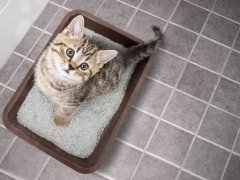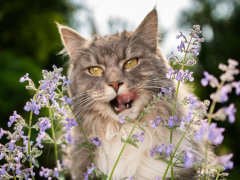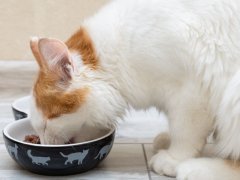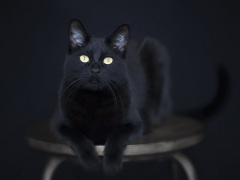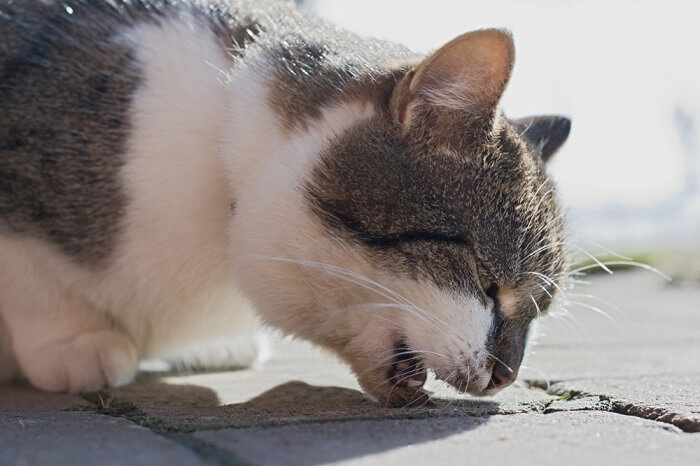
Shuttestock
It’s always upsetting when you notice your cat vomiting, never mind the mess that needs to be cleaned up. But how can you know if your cat’s vomiting is harmless or something to be concerned about?
Vomiting, also called throwing up, is the emptying of a cat’s stomach contents. Cats vomit for many different reasons. Some of the causes of vomiting are extremely serious, and others are less worrisome. It pays to know a little bit about vomiting in cats so you know what to do if your cat ever throws up.
Quick Overview: Cat Vomiting
Urgency: Moderate depending on frequency and other symptoms.
Requires Vet Visit: Yes, if more than once or twice a month.
Seen in Cats: Frequently
May be Linked to: Inflammatory bowel disease, repeated dietary indiscretion, hairballs, diet intolerance, foreign material, parasites, chronic constipation, stomach inflammation or ulceration, cancer.
Requires Ongoing Medication: Treatment depends on the underlying cause found. Prescription diets, medication for nausea/vomiting, antacid medication, steroid medication, deworming medication, laxatives.
Vomiting Versus Regurgitation
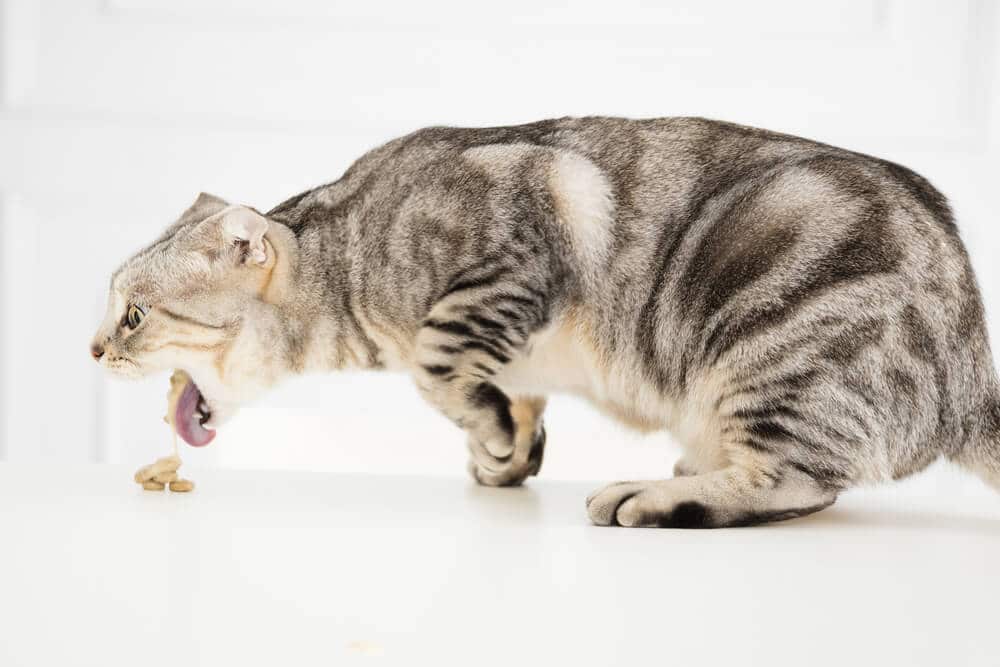
You can identify whether your cat is vomiting or regurgitating by observing him in the act. While vomiting involves heaving and stomach contractions, regurgitation is quick and looks almost effortless.
Although the two occurrences look similar, vomiting is different from regurgitation. Vomiting empties the stomach, while regurgitation empties the esophagus (the long tube that delivers food to the stomach).
Regurgitation happens immediately after the cat swallows food. Rather than the heaving and stomach contractions you will see just preceding a vomiting episode, regurgitation happens fast and looks almost effortless.
Vomit may or may not contain pieces of partially digested food or even undigested food. In contrast, with regurgitation, you will always see food, which often comes out in one long tube shape that matches the shape of the cat’s esophagus. Regurgitation can be caused by congenital factors (something the cat is born with) or it can develop in response to a disease. If you suspect your cat is regurgitating, it’s important to seek out veterinary care.
Vomiting Versus Hairballs
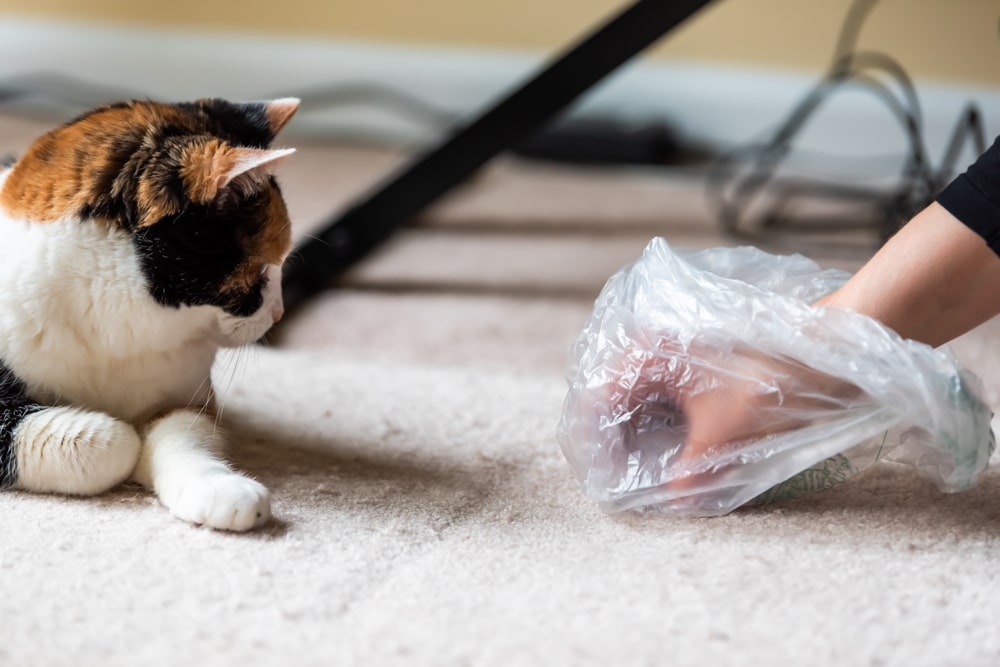
When cats vomit hairballs, they are expelling hair that’s coalesced in their body, rather than regurgitating or vomiting food.
Any time your cat coughs up a hairball, she is vomiting. However, once the hairball is out, the vomiting should stop. This is not to say that hairballs are never a serious matter.
Sometimes, a cat may vomit repeatedly in an attempt to eliminate a large hairball in the stomach. If the vomiting is not productive and the hairball is not expelled, the hairball can become lodged in the digestive tract, causing potentially life-threatening problems.
Causes of Cat Vomiting
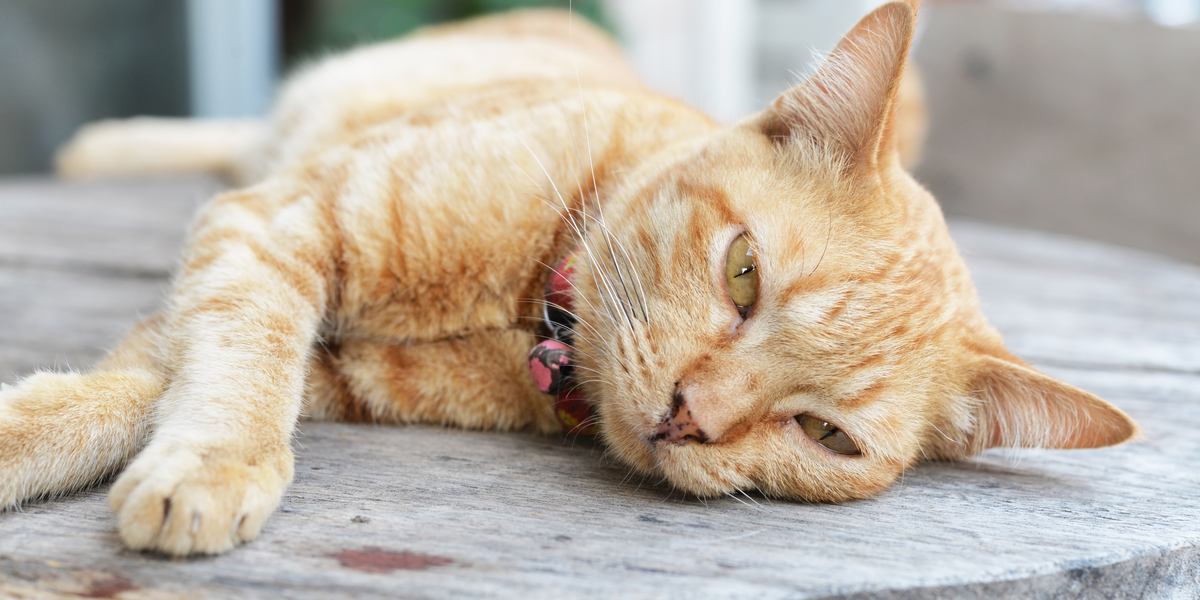
When used against infections caused by the coccidian group Isospora, Albon is typically effective at eliminating the parasite.
Why do cats throw up? Vomiting is a sign that something is upsetting your cat’s digestive system. Some causes of vomiting in cats, like hairballs, are less serious.
But others, like poisoning and pancreatitis (inflammation of the pancreas), can be deadly. Certain health issues may also cause vomiting and other symptoms.
Some of the more common causes of vomiting in cats include:
- Cancer
- Constipation
- Coughing
- Diabetes mellitus
- Eating spoiled food
- Eating human foods that are toxic to cats
- Exposure to toxic levels of pyrethrins or pyrethroids
- Food allergies
- Hairballs
- Hyperthyroidism (overactive thyroid gland)
- Infection (bacterial or viral)
- Inflammatory bowel disease (IBD)
- Ingesting plant material
- Internal parasites
- Kidney disease
- Liver disease or liver failure
- Motion sickness
- Neurological or inner-ear disorders
- Pancreatitis
- Poisoning
- Foreign body lodged in the stomach or intestines (obstruction)
- Switching to a new food suddenly
Poisoning is always a serious concern any time your cat is vomiting.
If your cat is vomiting and you suspect she might have eaten something she shouldn’t have, seek urgent care.
Some common causes of poisoning in cats include:
- Consuming toxic plants, like lilies
- Ingesting rodent poison (including eating a dead rat or mouse that consumed the poison)
- Using dog flea and tick preventive products on your cat (these preventatives can contain pyrethrins, which are toxic to cats)
- Being exposed to garden chemicals and insecticides
- Swallowing antifreeze
- Eating human foods that are toxic to cats
- Ingesting human medications
What To Do if Your Cat Is Being Sick
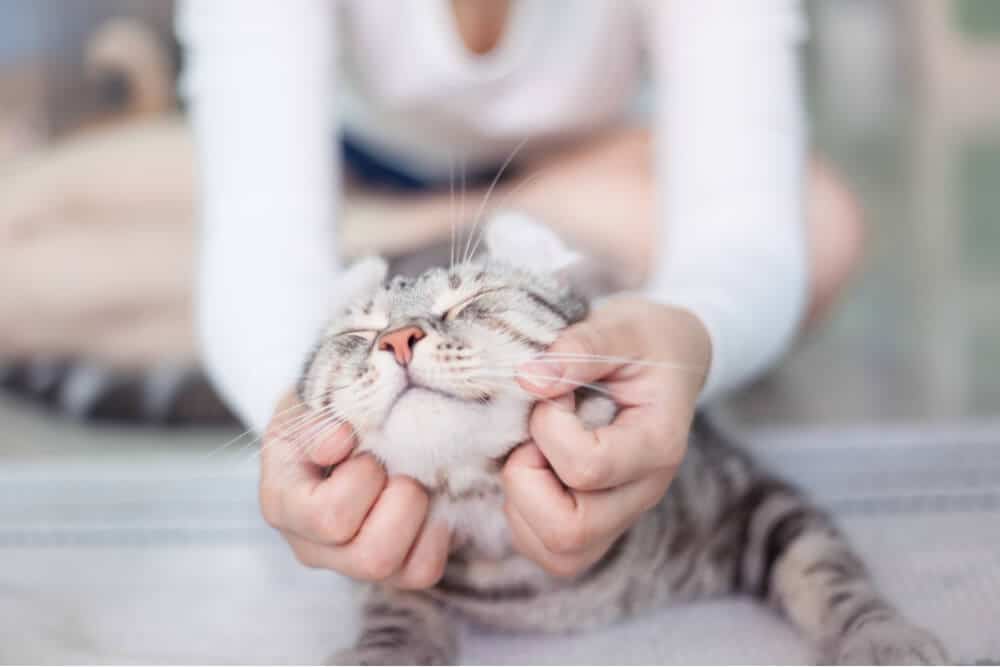
If you’ve seen your cat vomiting, you need to identify the cause and then care for them accordingly.
In addition to finding vomit on the floor, some other signs that your cat is feeling nauseous include drooling, gagging, retching, licking her lips, repeatedly swallowing, and acting uncomfortable or restless.
Your cat might vomit up food or she might vomit liquid or bile. The vomit may be thick or foamy. If you see hair, plant material, or anything else in the vomit, make a note of it and tell your veterinarian—it might be a clue to what is causing the vomiting.
If your cat vomits just once and seems to be acting normal otherwise, it’s possible that it was an isolated occurrence of stomach upset or perhaps a hairball (especially if you find a clump of hair in the vomit).
You can take a wait-and-see approach, watching for more vomiting and taking note of your cat’s demeanor. If the vomiting subsides on its own, and your cat is acting fine, the vomiting may have resolved on its own.
On the other hand, if your cat is experiencing repeated vomiting, if you see blood in the vomit, or if your cat is acting very sick, she should be seen by your veterinarian as soon as possible.
Continuous vomiting in and of itself can cause life-threatening dehydration and imbalances of electrolytes like sodium and potassium, so frequent vomiting requires immediate veterinary care.
Consider the following when your cat is vomiting:
Frequency of vomiting: Persistent vomiting (more than once or twice in 24 hours) requires veterinary attention. Vomiting that continues longer than a day or two, even if it’s only once or twice in 24 hours, should also be investigated.
Cat’s demeanor: If your cat is vomiting and also acting very ill (lying around, not wanting to eat or play, vocalizing excessively, having accidents outside the litter box), or if your cat is experiencing diarrhea or constipation along with the vomiting, bring her in for an exam as soon as you can.
Appearance of blood: Vomiting blood is called hematemesis. Blood in cat vomit might look bright red or it might look dark brown or black, like coffee grounds. Hematemesis indicates that the cat may be experiencing internal bleeding—a medical emergency. Any time a cat is vomiting blood, she should be examined by a veterinary professional.
There are two types of vomiting: acute vomiting and chronic vomiting. Acute vomiting is vomiting that comes on all of a sudden. You might see acute vomiting in cases of cats that have been poisoned, cats that eat spoiled food (food poisoning), and sudden-onset illness.
Chronic vomiting occurs occasionally and somewhat regularly over time. Some cat owners become used to their cat throwing up, but frequent vomiting is not something to write off as something the cat just “does.”
Although it can be normal for a cat to vomit every once in a while, if your cat is throwing up more than once or twice a month, it could mean something is going on that requires intervention. Persistent occasional vomiting doesn’t necessarily have to result in weight loss to be problematic. In the case of chronic vomiting, a visit to the veterinarian is in order.
What To Give a Cat for Vomiting
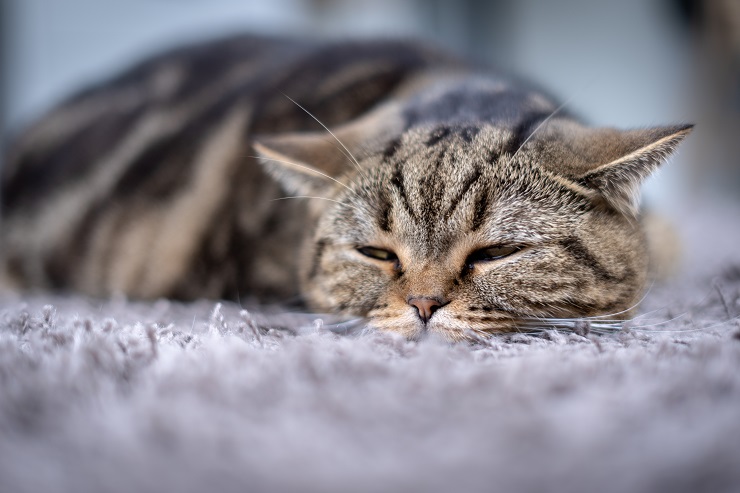
Treatment for vomiting depends on what is making your cat throw up. For instance, if your cat has ingested something toxic, treatment will be aimed at eliminating the poison and providing supportive care.
If your cat has swallowed a foreign object that is lodged in his intestinal tract, surgery might be necessary to resolve the blockage. If your cat has a medical condition like diabetes, pancreatitis, or IBD, the vet will initiate treatment to address the underlying disease as well as the vomiting.
When you bring your cat to your veterinarian to be examined, the veterinarian will examine your cat and ask you questions about how she’s been acting and whether or not she might have gotten into something like spoiled food or poisonous plants.
The vet might also recommend some tests like blood work, urinalysis, a fecal exam to look for intestinal parasites, or abdominal X-rays or ultrasound. Once the underlying cause of the vomiting has been determined, treatment can be initiated. Sometimes no cause can be determined.
It’s not uncommon for a cat’s digestive tract to become upset and need a little help settling down.
General treatment for vomiting may include one or more of the following:
Antiemetic (anti-vomiting) medication: An antiemetic drug will calm your cat’s nausea and stop the vomiting.
Fluids: If your cat is dehydrated from repeated vomiting, fluids will be given. Depending on how dehydrated your cat is, fluid therapy may be administered either under the skin (subcutaneous) or intravenously via an IV catheter.
Bland diet: After a vomiting episode, your cat’s digestive system will be very unsettled, so your veterinarian might recommend feeding a bland, easily digestible diet for a few days.
Your vet might send you home with a prescription diet that’s very gentle on the stomach, recommend another type of cat food, or even suggest a home-cooked diet to feed until your cat’s stomach has settled down.
If your cat is vomiting only occasionally, your vet might suggest withholding food for 24 hours to give your cat’s digestive tract a little time to rest.
Never Ignore Vomiting
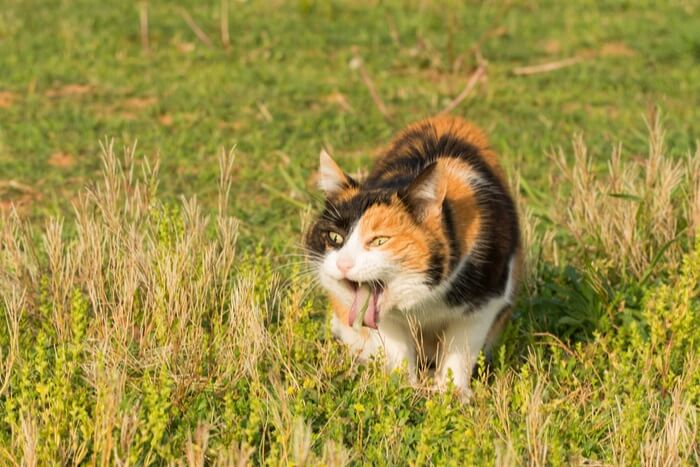
When your cat is vomiting, don’t wait too long to seek veterinary care. Some causes of vomiting are serious, even life-threatening. Also, the longer you wait the sicker your cat will become, which can make it more difficult to treat your cat’s condition and lead to more costly treatment.
Frequently Asked Questions
Why is my cat throwing up?
Whrowing up is a sign that something is upsetting your cat’s digestive system. Some causes of vomiting in cats, like hairballs, are less serious.
My cat keeps throwing up but seems fine?
Although it can be normal for a cat to vomit every once in a while, if your cat is throwing up more than once or twice a month, it could mean something is going on that requires intervention



